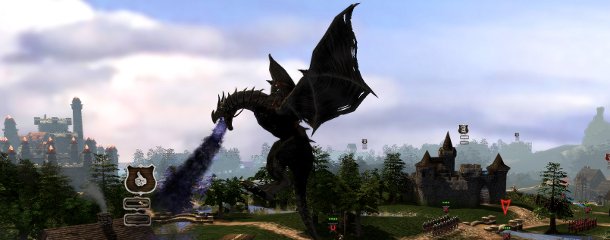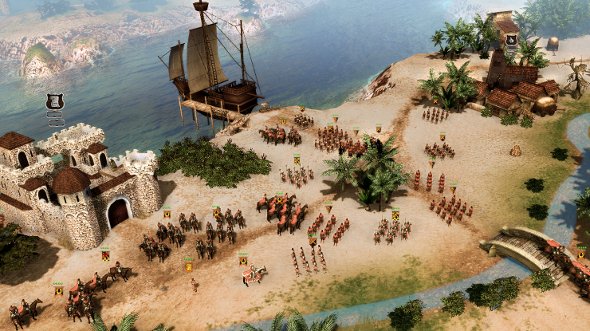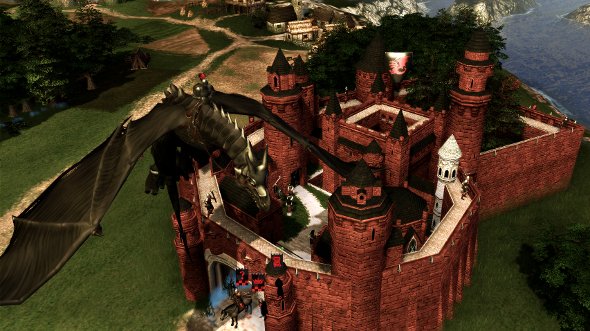A Game of Thrones: Genesis preview

There are monsters in George R R Martin's A Game of Thrones, the first book in his superlative Song of Fire and Ice series, but they're not the orcs, kobolds and dingly-dell dwellers of traditional fantasy. They're men and women. Backstabbing is a sport on the continent of Westeros and the story arc is thick with the blood spilled by characters both innocent and evil.
It's the perfect setting for a sneaky kind of strategy game. Double-crossing and baby-murder feature as heavily as gigantic battles, so devs Cyanide have tried to work implementations of nastiness into their game. Genesis is set in the generations before Martin's books begin, and players won't cross the seas to other continents. But don't expect that to be a limiting factor; Westeros is 3,000 miles north to south and studded with landmarks covered by the books. Important locations such as Casterly Rock and King's Landing appear on the world map and the seven regions are split between the great houses of Westeros as they appear in the lore: the Starks up north, the Lannisters in the west and so on.
But how do you turn so many feuds and family fights into a strategy game? Designer Regis Robin explains how Genesis grew in development. “Our original thoughts were much more limited. We were thinking of a classic RTS, with factional clashes and a higher economic element. But that wouldn't really have done justice to the Machiavellian core of books.”

Genesis has two modes: Campaign and Versus. Regis describes the former as a training ground for the latter. To win, you'll need to earn enough prestige points to ascend to Westeros's uniting Iron Throne. In its victory conditions, Genesis is still an RTS, but it differs to most of its peers, as Regis explains. “There's no basebuilding, no development of technologies, no mass-production of fighting units. The key is alliance building.”
The game is split into four distinct facets, termed 'economic', 'military', 'diplomatic' and 'underhand'. Despite Cyanide's new mechanics, genre standards haven't been totally jettisoned – you'll still need to pool gold and food, and raise armies. These armies then require upkeep, but can be hurled at a foe's kingdom. Battles are battles – get a bigger or better force and roll over your foe – but military units also have the option to siege castles and towns. “Capturing a town by siege will obviously bring it into your camp, but its lord can be as easily won over by diplomatic means,” Robin says.
Alliances come in four friend-flavours: Secret Agreement, Alliance, Blood Alliance and Pact. Pacts tie houses together loosely enough that they can be broken, but do that and you'll lose prestige points. Blood Alliances are stronger – marriages forged between two families that have the chance to produce an heir, but they're not bulletproof. Genesis's 'underhand' tactical options allow the end of a Blood Alliance by an assassin.

Pikemen, swordsmen and their stabby chums can be hired, but the unit pool is swollen by the addition of seductive noble ladies you can send in to woo an enemy's general, and envoys to carry diplomatic messages. But Robin's favourite unit is the spy. “I love infiltrating an enemy camp and getting my spy hired as one of his envoys, assassins or commanders.
The biggest gaming news, reviews and hardware deals
Keep up to date with the most important stories and the best deals, as picked by the PC Gamer team.
“A bride can avoid the attempt on her life if the enemy camp has been infiltrated by a spy who's turned the would-be assassin to his side. The latter's actions will then be fake, although they are reported as real to his paymaster.” The bride survives in secret, the assassin's report is fabricated and the game's tactical landscape changes entirely.
What happens to that spy eventually, when he's busted? “It can't go on for ever and he'll end up in a dungeon somewhere. But it's worth the entertainment!”

